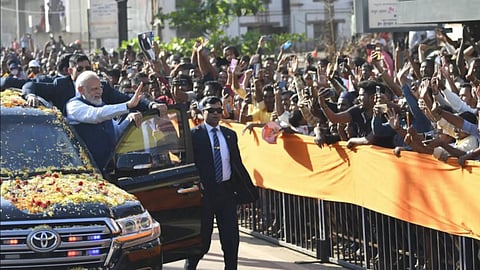Can Prime Minister Narendra Modi as the BJP’s mascot and chief campaigner turn the tide for his party in Karnataka? Indeed, Modi’s ability to blunt the anti-incumbency against the Basvaraj Bommai-led BJP government will be put on test in the coming weeks. Party sources admit that it is only the ‘Modi magic’ that can pull off a victory for the BJP in a state, which has been described as the party’s gateway for the south.
A C-Voter survey has predicted a clear majority for the Congress party in the Karnataka assembly poll. Over 57 per cent respondents said that they are “angry with the state government led by BJP” and want to change it. The state government has been rated poorly, despite Modi performing well in the opinion poll, as 47.4 per cent respondents rated his performance ‘good’.
The BJP’s state unit has planned more than 20 election rallies for Modi and party managers are working overtime to meet the schedule. The plan is also to have three rallies each in the six regions into which the state has been divided. Some regions like Hyderabad-Karnataka (bordering Andhra Pradesh), which have 40 assembly seats, will be in focus. Congress president Mallikarjun Kharge belongs to this region. Rallies are being planned in areas which are the strongholds of the Congress and the Janata Dal (Secular).
As the Bommai government is facing charges of corruption and administrative ineptitude, Modi’s campaign will connect with local development issues and local icons. He has already held seven rallies in the state in places like Hubli and Mandya before the election dates were announced. Modi has also inaugurated a number of projects.
New quota regime
However, the BJP strategists are not too sure whether Modi’s name and presence alone will deliver, like it did in Gujarat. As a back-up, the BJP and the state government have introduced a new quota regime to appeal to certain castes.
The new norms are for reservation in government jobs and education for other backward classes, scheduled castes and scheduled tribes, aimed at countering the AHINDA combination of minorities, SCs and STs which the former chief minister and Congress leader, Siddaramaiah, has forged.
To begin with, the government has scrapped the backward classes quota for Muslims, which has been in force in the state for the last 100 years. The quota has been reallotted to Lingayats and Vokkaligas, the two dominant communities in the state.
Muslims can now only claim quota benefits under the 10 per cent reserved for Economically Weaker Sections. The quota for SCs has been raised from 15 per cent to 17 per cent and that of STs from 3 per cent to 7 per cent. It has fixed a new quota within quota for SCs.
Karnataka is the only state in southern India where the BJP has formed the government twice, in 2008 and 2018. However, both times, the BJP did not cross the majority mark in the assembly but was the single largest party in the House.
The rise of the BJP in Karnataka began from coastal Karnataka, from where it slowly expanded its footprint to other regions. In the last few elections, the BJP has performed well across the state except Southern Karnataka (or Mysore region).
To stem discontentment, the BJP plans to hold on to the announcement of party tickets till the last minute. B.S. Yediurappa (BSY), who was replaced by Bommai because of his old age, is being pulled out from among the mothballs to consolidate the BJP’s Lingayat vote bank. He will be the local face of the campaign to supplement Modi’s appeal and wooing the influential Lingayat community.
Lingayats and Vokkaligas are the two major dominant communities in Karnataka -- both economically and politically. Lingayats have a greater population in the state, followed by Vokkaligas. Old Mysore or Southern Karnataka is the base of the Vokkaligas. They are mostly a peasant class with a higher concentration in the Southern region.
The former prime minister of India (also former chief minister of Karnataka) and Janta Dal (Secular) leader H.D. Devegowda hails from the Vokkaliga community and from this region. Later, his son H.D. Kumaraswamy became the chief minister of the state.
Vokkaligas have been consistently and solidly backing JD (S) in southern Karnataka. This is the only region where JD (S) has received 30 per cent more votes in the last many elections and won a significant number of seats. In the 2018 assembly elections, JD (S) received 38 per cent votes in Southern Karnataka, while their overall vote share in the state was 18 per cent.
Of late, the state Congress president, D.K. Shivakumar, has emerged as a Vokkaliga strongman, challenging the Gowda family.

